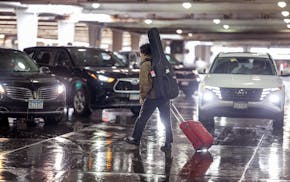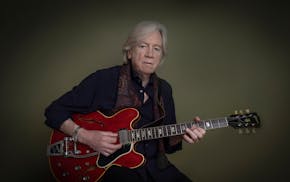Biopics are notorious for playing loose with facts. We understand, it's poetic license, a desire by a filmmaker to add more drama to a not-compelling-enough real-life story. But we newspaper journalists are truth seekers. We want facts and timelines to be accurate, not conflated storylines to squeeze a wealth of (mis)information into a constricted period.
So when director James Mangold takes liberties with Bob Dylan's story in the new engrossing, musically rich period-piece, "A Complete Unknown," we feel compelled to speak up. We know that the Minnesota bard invented things in his own biography and memoir, so we're not upset with Mangold for simple twists of plots. We just want to set the record straight about our Bob.
Not one of these inaccuracies should detract from the enjoyment of the movie. But, for the record, here are 10 miscues in "A Complete Unknown," which chronicles Dylan from winter 1961 to summer of '65.
1. The most egregious misstep: Suze Rotolo, Dylan's muse, early lover and radical influence, was no longer in a relationship with him at the Newport Folk Festival in 1965 despite the film having them ride together to the momentous event on Dylan's motorcycle. They'd broken up in '64. By the summer of '65, Dylan also had moved on romantically from Joan Baez (such drama), and he was involved with Sara Lownds, who was pregnant with their first child and would become his first wife. (By the way, Dylan insisted that filmmakers not use the private-loving Rotolo's real name in the movie; her character is "Sylvie Russo," though all other names in the film were real people in Dylan's life.)
2. The movie's opening moments mush three separate things into one event. Dylan's first visit to Woody Guthrie was to the ailing folk singer's home, not his hospital room as the movie indicates. Pete Seeger wasn't there during the first hospital encounter, and Dylan didn't serenade with his "Song for Woody" at the initial meeting.
3. Joan Baez met Dylan when she went to see him perform at Gerde's Folk City in Greenwich Village. In the movie's meet-cute, Baez performs, then emcee Seeger welcomes Dylan to the stage right after her. Didn't happen that way.
4. The day journalist Robert Shelton's career-changing review of Dylan was published in the New York Times in 1961, the singer went to Columbia Records studio to play harmonica on Carolyn Hester's album, not, as the film depicts, to record his own album. He cut his LP about two months later.
5. The movie indicates that Dylan was composing his landmark "Blowin' in the Wind" during the Cuban Missile Crisis in October 1962. According to Rolling Stone, he'd published the song in the late May 1962 issue of Broadside magazine as well as the June 1962 issue of Sing Out! magazine and then recorded the tune in July 1962.
6. Dylan did not sing "The Times They Are A-Changin'" at the 1964 Newport Folk Festival, but this fib makes a great dramatic statement in the film.
7. The movie ends with the Newport Folk Festival in July 1965, but "A Complete Unknown" shows a recording session for the song "Highway 61 Revisited" prior to Newport. That recording actually took place in August 1965. As Rolling Stone pointed out, Bob Johnston produced "Highway 61 Revisited," not Tom Wilson, as represented in the film.
8. In Mangold's portrayal of the pivotal 1965 Newport Folk Festival, where Dylan famously went from acoustic folkie to electric rocker, Johnny Cash was a key figure on the scene. Not true. Cash wasn't at Newport that year.
9. "Judas!" shouts an angry fan during Dylan's '65 Newport performance in "A Complete Unknown." Didn't happen. That infamous incident took place May 17, 1966, at a concert in Manchester, England.
10. Actor Timothée Chalamet impressively adopted Dylan's posture, mannerisms, affectations, attitude, as well as an approximation of his speaking and singing voice, and even his long fingernails for guitar picking. But Dylan has blue eyes, not those chocolate Willy Wonka orbs of Chalamet. Contacts, please.

You can now sign up to earn Delta SkyMiles with Uber

Justin Hayward explains the noisy cat on 'Nights in White Satin' and other Moody Blues stories

These 5 Twin Cities area fashion shows celebrate spring

